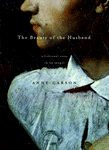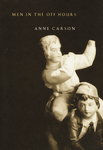|
|
 |
|
|
 |
 |
 |
 |
Anne Carson lives in Canada.
Photo (c) Allen McInnis
|
|
 |
 |
 |

|
The Beauty of the Husband is an essay on Keats's idea that beauty is truth, and is also the story of a marriage. It is told in twenty-nine tangos.
A tango (like a marriage) is something you have to dance to the end.
"Brilliantly captured . . . Reading her is to experience a euphonious, mystical sort of perplexity . . . punctuated by what the husband himself calls "short blinding passages," which in this book consist of moments of almost unbearable poignancy. . . . We read conversations that show the unbridgeable distance and unbreakable intimacy of the lovers, caught in the dance of beauty and destruction, at the same time. . . . In a few swiftly cut lines, her 29 tangos, Ms. Carson tells what might be seen as a pedestrian love story: a marriage, a divorce, a sad life left behind. But there is nothing pedestrian about the way her verse pierces the mind with a laserlike light." —Richard Bernstein, New York Times
"This poet's voice is so strange, so unique, so wholly her own that it seems a paradox that she already has such a wide audience. And the message of her seventh book is another paradox: that sexuality–both the body's intellect and the mind's desire–is thinking."–Talk (Talk 10 list, March)
"Impressive. . . . [Carson's] references to or quotes from the likes of Homer and Jane Austen and Beckett are kept in a vibrant present with infusions of a jazzy language that has come to define our age and our relationships. . . . With swift strokes depicting the illusions and disillusions of a marriage gone sour, Carson has managed to make the intellectual life hip. In her hands, a quote from Plato seems as natural as a pop reference. . . . Then there are the lines of sheer lyricism, lines that send us spinning back to idea of beauty, of truth. . . . This new work, while resembling poetry, still has that edge, that charming threat of becoming at any moment something other than what we expect. . . . A single light does not illuminate this volume. It is as though individual candles were strategically placed throughout the length of the marriage, highlighting essential moments. . . . The Beauty of the Husband is an essential song, fully aware of all the perils and brave enough to play itself out."–Dionisio D. Martinez, Miami Herald
"In Carson's most welcoming and intimate work to date, she loosens the robes of erudition that cloaked Men in the Off Hours in an aura of wry intellectualism. Here the tango provides inspiration for lashingly precise yet sultry and graceful poems that depict the eroticism and possessiveness, competition and resentment of a marriage in dissolution, a process envisioned as both an elaborate dance and vicious warfare....With Keats as her touchstone, Carson—audacious, funny, poised, and extraordinarily smart—considers our often contradictory needs for beauty and love....[A] piquant inquiry into the nature of desire far beyond familiar parameters."
—Booklist
"[T]hough she spangles her work with the costume jewelry of literary and historical allusion, challenging the reader with ... puzzles, [Anne Carson] also evinces a rare grasp of emotional chemistry. This "fictional essay" on marriage and adultery...cuts more truly, more deeply than any plain-spoken confessional monolog, dramatizing inner and outer conflict with a precise, knowing wit. . . . Rooted in a literary consciousness at once Romantic and ironic, this is as fresh and compelling a poetic treatment of a familiar subject as one is likely to find in any century."—Library Journal
|
|
 |
 |

|
Following her widely acclaimed Autobiography of Red ("A spellbinding achievement" --Susan Sontag), a new collection of poetry and prose that displays Anne Carson's signature mixture of opposites--the classic and the modern, cinema and print, narrative and verse.
In Men in the Off Hours, Carson reinvents figures as diverse as Oedipus, Emily Dickinson, and Audubon. She views the writings of Sappho, St. Augustine, and Catullus through a modern lens. She sets up startling juxtapositions (Lazarus among video paraphernalia; Virginia Woolf and Thucydides discussing war). And in a final prose poem, she meditates on the recent death of her mother.
With its quiet, acute spirituality, its fearless wit and sensuality, and its joyful understanding that "the fact of the matter for humans is imperfection," Men in the Off Hours shows us "the most exciting poet writing in English today" (Michael Ondaatje) at her best.
|
|
 |
 |

|
A NEW YORK TIMES NOTABLE BOOK OF THE YEAR
National book Critics Circle Award Finalist
"Anne Carson is, for me, the most exciting poet writing in English today."--Michael Ondaatje
"This book is amazing--I haven't discovered any writing in years so marvelously disturbing." --Alice Munro
The award-winning poet Anne Carson reinvents a genre in Autobiography of Red, a stunning work that is both a novel and a poem, both an unconventional re-creation of an ancient Greek myth and a wholly original coming-of-age story set in the present.
Geryon, a young boy who is also a winged red monster, reveals the volcanic terrain of his fragile, tormented soul in an autobiography he begins at the age of five. As he grows older, Geryon escapes his abusive brother and affectionate but ineffectual mother, finding solace behind the lens of his camera and in the arms of a young man named Herakles, a cavalier drifter who leaves him at the peak of infatuation. When Herakles reappears years later, Geryon confronts again the pain of his desire and embarks on a journey that will unleash his creative imagination to its fullest extent. By turns whimsical and haunting, erudite and accessible, richly layered and deceptively simple, Autobiography of Red is a profoundly moving portrait of an artist coming to terms with the fantastic accident of who he is.
"A profound love story . . . sensuous and funny, poignant, musical and tender."--The New York Times Book Review
"A deeply odd and immensely engaging book. . . . [Carson] exposes with passionate force the mythic underlying the explosive everyday." --The Village Voice
|
|
 |
 |

|
The poetry and prose collected in Plainwater are a testament to the extraordinary imagination of Anne Carson, a writer described by Michael Ondaatje as "the most exciting poet writing in English today." Succinct and astonishingly beautiful, these pieces stretch the boundaries of language and literary form, while juxtaposing classical and modern traditions.
Carson envisions a present-day interview with a seventh-century BC poet, and offers miniature lectures on topics as varied as orchids and Ovid. She imagines the muse of a fifteenth-century painter attending a phenomenology conference in Italy. She constructs verbal photographs of a series of mysterious towns, and takes us on a pilgrimage in pursuit of the elusive and intimate anthropology of water. Blending the rhythm and vivid metaphor of poetry with the discursive nature of the essay, the writings in Plainwater dazzle us with their invention and enlighten us with their erudition.
"Breathtaking. . . . A work of gorgeous innovation and a staunch hypnotic intelligence."--The Village Voice
"Carson has . . . created an individual form and style for narrative verse. . . . Seldom has Pound's injunction 'Make It New' been so spectacularly obeyed." --The New York Review of Books
"Anne Carson is a philosopher of heartbreak." --The Nation
|
|
 |
|
|
|




